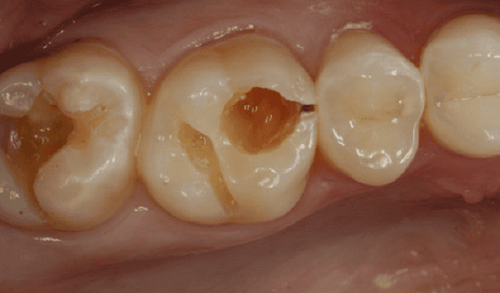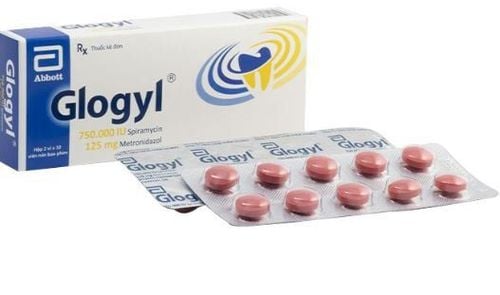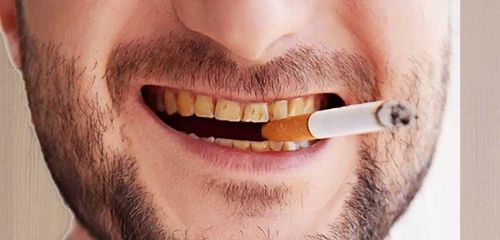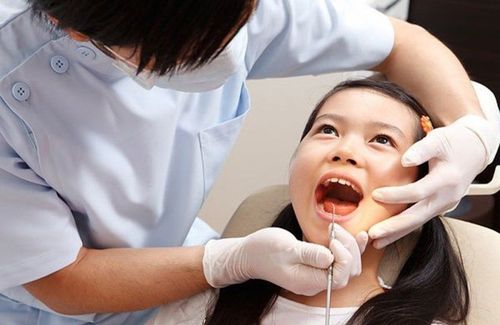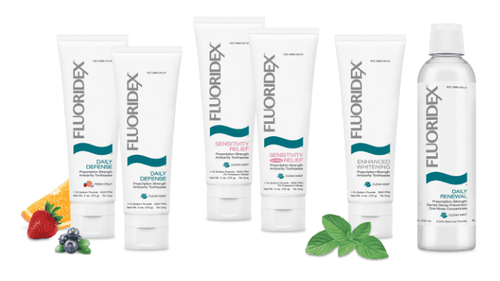This is an automatically translated article.
The article was professionally consulted with Master, Doctor Dang Tien Dat - Doctor of Dental - Jaw - Facial - Department of Medical Examination & Internal Medicine - Vinmec Ha Long International Hospital.Oral health reflects the condition of the teeth, gums and oral cavity. Taking good care of your oral health will prevent gum disease, help protect your health, and give you confidence.
1. Proper oral health care measures
1.1. Brush your teeth twice a day
Tooth and gum disease are the two biggest and most common oral health problems. Brushing your teeth twice a day in the morning after waking up and at night before going to bed is the most basic and important oral health care measure.
Should change toothbrush every 3-4 months. For people with braces, it is necessary to use a special brush as well as other oral hygiene tools according to the instructions of the dentist. If you have health problems that make it difficult to hold a toothbrush, you can use an electric toothbrush.
1.2. Brush your teeth properly
To take care of oral health, brushing your teeth regularly is not enough, but brushing must be done properly to remove the plaque accumulated on the surface of the teeth, limiting the bacteria that cause tooth decay and gingivitis. If you brush your teeth incorrectly, it will wear down the enamel layer, causing sensitive teeth, plaque will harden and gradually accumulate, creating favorable conditions for bacteria to grow and attack teeth and gums leading to dentist. In addition, brushing too hard also damages the gums, causing gingivitis and receding gums.
The correct brushing operation is as follows:
Place the toothbrush horizontally and at an angle of about 450 degrees to the gum line so that the bristles are in contact with both teeth and gums. Gently brush the outer surfaces of all teeth in the upper and lower jaws with a distance of 2-3 teeth (upper and lower down), or rotate the toothbrush so that the bristles can get into each tooth. , from 5 to 10 times, to remove all the food stuck to the teeth. Brush the inside of the upper and lower teeth in the same way as the outside by brushing up, down, or in a circular motion. Place the bristles parallel to the chewing surfaces of your teeth and then gently move the brush about 10 times from the inside out.
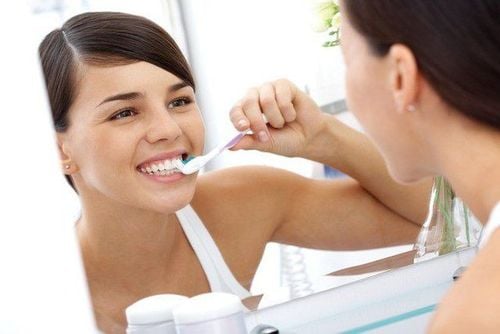
1.3. Tongue cleaning
Not only does it accumulate on teeth that cause tartar, but plaque can also build up on the tongue, causing oral health problems and bad breath. Therefore, every time you take care of your teeth, combine brushing with brushing the surface of the tongue from the inside out with a toothbrush or a specialized tongue brush.
1.4. Use fluoride toothpaste
Choosing the right toothpaste is very important for oral health. There are many types of toothpaste. It comes down to taste and brand preference, but choosing a fluoride toothpaste should be a top priority. Fluoride is a substance that fights germs that cause tooth decay, while providing a protective barrier for teeth, helping to strengthen tooth enamel and reduce tooth decay.
1.5. Use the dental floss
Toothpicks often do not reach the small crevices of the teeth. Meanwhile, floss or water flosser will gently remove small pieces of food stuck between teeth without hurting gums. When the interdental space is completely cleaned, plaque, gum irritation and inflammation will be significantly reduced.
1.6. Gargle immediately after eating
Besides proper brushing and flossing, rinsing with antibacterial water can prevent tooth decay and gum diseases. Mouthwash helps protect oral health in 3 ways:
Remineralizes teeth Reduces acidity in the mouth Cleans hard-to-reach areas in and around gums. Gargling with antibacterial water after eating is a fairly comprehensive cleaning measure, especially for children over 12 years old or those who are not used to using water floss or toothpicks to clean their teeth.
In addition, chewing sugar-free gum after each meal can increase saliva production, help neutralize acids and clean bacteria on the tooth surface.
1.7. Wear a mouth guard and don't smoke
If you participate in sports or recreational activities that have a risk of damaging your teeth, you must wear a mouth guard.
Tobacco turns teeth yellow, causes gum disease and increases the risk of oral cancer. Therefore, not smoking is a way to protect oral health.

1.8. Healthy diet
No matter your age, a healthy diet is always beneficial for oral and gum health.
Drinking plenty of filtered water is good for oral health as well as overall health. Drinking water after each meal can help reverse the negative effects of acids in foods and beverages.
A balanced diet of nutrients including fresh foods such as nuts, whole grains, fruits, vegetables and dairy products will provide the body with all the nutrients it needs.
Limit eating sweets as well as acidic foods. The sugar in sweets is digested by bacteria in the mouth, which will turn into acids that can erode tooth enamel and lead to tooth decay. In addition, the sweetest foods are cakes and candies that often stick to the tooth surface for a long time, increasing the amount of acid for a long time. Fruits contain a lot of acids such as oranges, lemons, pineapples, strawberries, and drinks such as tea and coffee, which affect tooth enamel. Carbonated water is also a risk factor for dental problems because the carbon in carbonated water increases acidity in the mouth. Rinse your mouth with filtered water after enjoying.
1.9. Dental visit at least 2 times per year
Periodic dental visit at least 2 times a year or more often if you have problems with teeth and gums for oral health care and advice. The dentist will scrape the tartar, examine the teeth to detect tooth decay and treat accordingly. In addition, regular dental examination also helps to detect risk problems and provide timely prevention solutions such as:
Early detection of signs of oral cancer: 90% of oral cavity cancers can be treated when detected early. If not diagnosed early, the cancer will metastasize and thus be more difficult to treat. Erosion of the chewing surfaces caused by grinding teeth during sleep is a disorder caused by anxiety or stress. If not detected and treated, there is a risk of tooth decay. Gum disease, including gingivitis or periodontitis, is the leading cause of tooth loss in the elderly. Drug interactions: Older adults, especially those with many medical conditions, are prone to dry mouth due to reduced saliva production, which is a risk of tooth decay and gum disease. There are about 800 medications that can cause this, so it's important to let your dentist know what medication you're taking so that you can change to a different medication or use a suitable mouthwash.
2. How to take care of oral health for babies and children
Parents can take care of their baby's oral health by following these suggestions:
Take care of your baby's teeth as soon as the first baby tooth erupts, usually at 6 months of age. Clean the new teeth every day by rubbing gently with a clean wet washcloth. When teeth get older, use a children's toothbrush. Children under 2 years old should not use toothpaste. Instead, let your child brush his teeth with water. You should only put a moderate amount of fluoride toothpaste about the size of a pea on the brush, because too much will cause white spots on children's teeth. Do not give your baby a bottle of milk or juice before bed as this can cause milk or juice to stay in the mouth and cause tooth decay due to bottle feeding. Oral health education for children. Teach children the importance of maintaining oral hygiene and how to brush properly. When children are 2 years old, parents can let children brush their own teeth under the guidance and supervision of adults. Limit giving children fast foods, marshmallows, sweets, and carbonated drinks. Encourage your child to eat plenty of fresh fruits and vegetables. Take your child to the dentist regularly. According to the recommendations of the American Dental Association, children should start going to the dentist from the age of 1 year. In a nutshell, brushing your teeth properly, flossing every day and having regular dental checkups... is one of the important things to do to maintain good oral health, thereby helping to prevent gum disease. , protect health and bring confidence to people.
=>> Advice from Master, Doctor Dang Tien Dat - Dentist - Maxillofacial Doctor - Department of Medical Examination & Internal Medicine - Vinmec Ha Long International Hospital:
Proper oral care will prevent Prevent and limit the diseases of Oral and Maxillofacial diseases. Customers should see a doctor soon for instructions on proper oral care and prevention of oral diseases. Currently, Vinmec is one of the leading prestigious hospitals in the country, trusted by a large number of patients for medical examination and treatment. The team of Odonto-Stomatology specialists and experts at Vinmec will guide customers to take care of their teeth properly for free.
Please dial HOTLINE for more information or register for an appointment HERE. Download MyVinmec app to make appointments faster and to manage your bookings easily.





